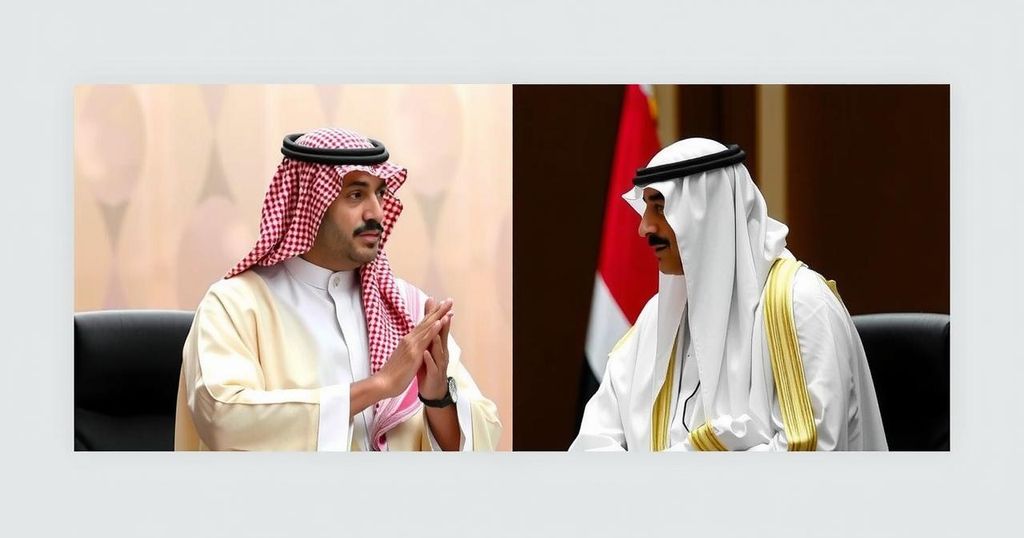Arab nations, led by Qatar, are initiating open dialogues with various factions in Syria to prevent the resurgence of civil conflict following the decline of Assad’s regime. Qatar emphasizes the necessity of an inclusive transition for all ethnic groups and stresses the importance of maintaining essential state services while recognizing the complexities posed by various militant groups as well as regional players such as Turkey.
Arab states, led by Qatar, are actively pursuing a dialogue with all factions in Syria in an effort to prevent a resurgence of the civil war and ensure a comprehensive transition that reflects the diverse demographics of the country. Majed al-Ansari, the spokesperson for Qatar’s foreign affairs ministry, emphasized the importance of dialogue after a meeting of Arab leaders in Doha to discuss the implications of President Bashar al-Assad’s regime’s abrupt decline.
Al-Ansari expressed gratitude for the minimal conflict that facilitated this transition, stating, “It makes it easier for international actors to go in and start engaging before any fighting might erupt amongst the parties on the ground.” He reported positively on the state of government institutions, noting that essential services such as policing, water, and electricity remain functional, which lends hope for a peaceful resolution.
He further highlighted the need for all groups to feel secure and included in Syria’s future, asserting, “No one group, no one party or sect should feel unsafe or excluded in the future of Syria.” He acknowledged the uncertainties surrounding the dominant military forces but stressed the importance of coordination among them to prevent internal conflicts.
Al-Ansari cautioned against complacency and recalled the pitfalls of previous Arab Spring movements, urging the necessity for a viable state that honors the sacrifices of the Syrian populace. He remarked on the prevailing challenges that could destabilize the region, including the presence of militants and the potential for Syria to descend into a failed state.
Qatar’s relations with Turkey were also highlighted, given Turkey’s significant influence in the region and its refugee situation due to the Syrian conflict. The spokesperson urged Israel to refrain from any actions that could complicate matters on the ground before dialogue begins.
He addressed the question of the Islamist militant group Hayat Tahrir al-Sham (HTS) potentially being part of the transitional authority, emphasizing the need for constructive engagement rather than preconceived judgments. Moreover, he underscored the importance of allowing the Syrian populace to determine the future, including how to address Assad’s regime’s failures. Lastly, he indicated the uncertainty surrounding Assad’s current location, stating, “He is in the wind. He is no longer in the city.”
The ongoing Syrian civil war, which began in 2011, has involved numerous factions and international actors, leading to substantial humanitarian crises and geopolitical instability. The recent developments in the Assad regime’s power dynamics prompted Arab states, particularly Qatar, to engage in discussions aimed at fostering a peaceful resolution. The importance of maintaining public services and ensuring security for all demographics within Syria is crucial for a stable transition, as is the acknowledgment of regional players such as Turkey and Israel who have significant interests in the outcome of the Syrian conflict. Qatar has historically opposed Assad’s regime, aligning itself with various opposition groups and advocating for a political solution that reflects the will of the Syrian people. This context is essential in understanding the motives behind the recent calls for dialogue and the complexities of forming any transitional government.
The initiative put forth by Arab states, particularly Qatar, seeks to address the urgent need for inclusive dialogue in Syria following the weakening of Bashar al-Assad’s regime. Recognizing the diverse makeup of Syrian society, the focus is on preventing further conflict while ensuring that all groups are represented in any future political framework. The complexities on the ground require careful orchestration of military forces and continuous dialogue amongst regional powers to avoid a repetition of past failures observed in the Arab Spring. The international community’s active engagement will also be crucial in guiding Syrian institutions towards a stable and viable state.
Original Source: www.theguardian.com






